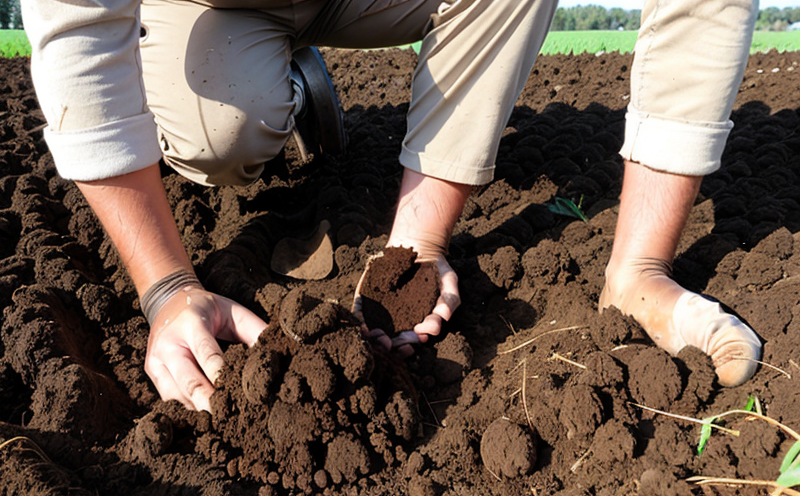Soil Leaching Potential Testing
In agriculture and forestry testing, soil leaching potential is a critical factor that influences the sustainability of farming practices. Soil leaching refers to the process by which water-soluble nutrients and pollutants move downward through the soil profile due to irrigation or precipitation. This can lead to nutrient depletion in the root zone, affecting crop productivity, and potentially cause environmental degradation if excess nutrients are lost into groundwater.
The importance of understanding soil leaching potential cannot be overstated, especially for quality managers and compliance officers responsible for ensuring sustainable agricultural practices. By accurately assessing this parameter, we can develop targeted strategies to mitigate nutrient loss and optimize resource use, thereby enhancing both economic efficiency and environmental responsibility.
Our Soil Leaching Potential Testing service employs advanced laboratory techniques to evaluate the leaching potential of various soil types under controlled conditions. This involves simulating real-world scenarios such as different rainfall intensities or irrigation regimes using standardized protocols from international standards like ISO 17892-4 and ASTM D6863.
During the testing process, we carefully collect samples from representative field locations to ensure that our results are reflective of actual agricultural conditions. These samples undergo rigorous preparation steps including air drying, sieving, and homogenization before being subjected to leaching tests in specially designed vessels.
The test apparatus used includes precision balances for accurate mass measurements, peristaltic pumps for consistent water flow rates, and temperature-controlled chambers that simulate various climatic conditions. The entire procedure adheres strictly to predefined methods outlined in relevant international guidelines ensuring reliability and reproducibility of the results.
A key aspect of this service is providing detailed reports which summarize all pertinent information about the tested soil including its texture classification, particle size distribution, cation exchange capacity (CEC), pH value, and electrical conductivity (EC). Additionally, our experts analyze the concentration levels of major plant nutrients such as nitrogen, phosphorus, potassium, along with trace elements like iron, manganese, zinc etc., before and after leaching.
By offering this comprehensive service, we aim to empower stakeholders involved in agricultural management decisions by equipping them with precise data regarding their soil's susceptibility to nutrient loss. Armed with such knowledge, they can implement effective mitigation measures tailored specifically to their unique operational requirements.
Applied Standards
The Soil Leaching Potential Testing service at our laboratory follows stringent guidelines set forth by recognized international standards organizations such as ISO (International Organization for Standardization) and ASTM International. These standards provide clear instructions on how to conduct these tests accurately while maintaining consistency across different laboratories worldwide.
- ISO 17892-4: Method for determining the leaching potential of agricultural soils
- ASTM D6863: Standard practice for collecting, preparing and shipping soil for testing
The adherence to these standards ensures that our results are consistent with those obtained by other reputable institutions around the globe. This enhances trust in our findings among clients ranging from small-scale farmers seeking improvements in crop yields to large corporations aiming for sustainable supply chains.
Benefits
The benefits of understanding soil leaching potential extend beyond mere academic interest; they have significant practical implications for various stakeholders within the agricultural sector. For instance, quality managers can use this information to adjust fertilizer application rates more precisely, reducing costs associated with over-application while still meeting nutritional needs.
Compliance officers benefit from knowing that their operations comply with legal requirements concerning environmental protection and resource conservation. R&D engineers gain valuable insights into soil behavior under different conditions which could lead to innovations in soil amendment technologies or improved irrigation systems.
For procurement personnel responsible for sourcing raw materials like seeds, pesticides, or even machinery parts, having accurate knowledge about local soils helps select suppliers who provide products suitable for specific growing environments. This ultimately leads to higher quality outputs at lower production costs.
International Acceptance and Recognition
The Soil Leaching Potential Testing service we offer is widely accepted internationally due to its rigorous adherence to recognized standards and best practices. Many countries around the world have adopted these methods as part of their regulatory frameworks for agricultural activities, making our results easily transferable across borders.
For example, European Union member states rely heavily on ISO 17892-4 when assessing soil health in relation to potential risks posed by pesticide residues. Similarly, North American countries like the United States and Canada use ASTM D6863 as a reference for collecting representative soil samples prior to analysis.
Our laboratory’s expertise in conducting this type of testing has been recognized not only within national boundaries but also internationally through collaborations with research institutions abroad. This global recognition adds credibility to our findings, ensuring that they are trusted by diverse groups including governmental bodies, non-governmental organizations (NGOs), and private sector entities alike.





